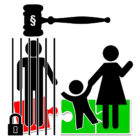
The Young and Homeless Have Hard Time Avoiding Arrest
|
They’re on our streets. In our schools and colleges. They’ve probably taken your fast-food order. But you wouldn’t know it.
Juvenile Justice Information Exchange (https://jjie.org/author/jjie-org/page/34/)

They’re on our streets. In our schools and colleges. They’ve probably taken your fast-food order. But you wouldn’t know it.

Congress reauthorized a key juvenile justice bill today, handing a win to youth advocates who have fought to update the legislation for more than a decade.
The House backed the Senate’s version of the bill Thursday morning, sending it to the White House for President Donald Trump to sign. The Senate unanimously approved a five-year reauthorization of the Juvenile Justice and Delinquency Prevention Act (JJDPA) on Tuesday night using a fast-track procedure that requires the support of every senator.

This year has been one of the most transformative years in history for New York’s juvenile justice system. Just a month after one of New York’s most groundbreaking juvenile justice reforms, Raise the Age, became a reality, New York City took a wrecking ball to the decades-old Spofford Juvenile Detention Centers in the Bronx.

As the holiday season rolls around and many of us are cherishing time with those we love, families separated by incarceration continue to face barriers when trying to maintain a sense of support and connection with their loved ones.

In 2013, the Wyoming Afterschool Alliance (WYAA) became interested in understanding the school-to-prison pipeline based on the alarming statistics that we were seeing in Wyoming and across the nation about incarceration and detention. It was confounding and disturbing to see more and more children and youth entering the system, especially at younger ages. What was going on? And, more importantly — why?

A bipartisan criminal justice bill before the Senate would affect only a handful of federal juvenile offenders, but legal experts hope it may spark action at the state level.

In my last column about Ahmed Hassan, a teenager born in New Jersey who was held in an Egyptian jail for a crime he did not commit, I primarily discussed the problems surrounding reentry after a prolonged jail sentence. Ahmed’s alleged “crime” was being an American citizen.

Commercial sexual exploitation of children (CSEC) has recently received much needed attention, but is by no means a new issue. Researchers have tried to approximate the scope of the problem, but it has proven extremely difficult to produce an accurate estimate of children who are victims of or at risk for CSEC in the U.S. State-level prevalence rates are equally difficult to produce, but a recent report estimated that more than 1,000 U.S.-born minors are sex trafficked in Ohio annually and thousands more are at risk for victimization.

Several states have announced they will continue collecting data on racial and ethnic disparities in the juvenile justice system, five months after Office of Juvenile Justice and Delinquency Prevention Administrator Caren Harp announced the agency is rolling back these reporting requirements. The announcements came in the chat box of an OJJDP webinar focused on federal data on girls in the juvenile justice system.

I never said "no."
In fact, I said "I love you."
He said "No, you don't."
He also said he was going to kill me.
I don't know if I believed him.